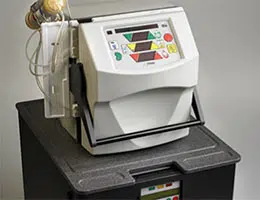 Hemodialysis is a medical procedure that allows the elimination of harmful substances from the blood . It is an extracorporeal dialysis that replaces, at least in part, the functioning of the kidney .
Hemodialysis is a medical procedure that allows the elimination of harmful substances from the blood . It is an extracorporeal dialysis that replaces, at least in part, the functioning of the kidney .
Dialysis consists of separating molecules according to their size using a membrane. In the field of medicine , such filtration allows the level of harmful substances in the blood to be reduced.
The kidneys are organs that filter the blood and then discard waste through urine . In the event of kidney failure , it is possible to use an artificial kidney that can be used to purify the kidneys outside the body.
Hemodialysis, in this framework, consists of extracting blood from the body to pass it through a dialyzer (the artificial kidney) that filters it. Once filtered, the blood is returned to the bloodstream.
A healthy kidney filters the blood to filter out waste, minerals, and excess fluid. On the other hand, it also generates hormones useful for the maintenance of blood and bones. A sick person, on the other hand, does not properly filter waste that is harmful to the body and this causes an increase in blood pressure, fluid retention and a decrease in red blood cells. This is the moment in which hemodialysis becomes necessary.
Hemodialysis treatment entails several changes in the patient's life, and one of the most obvious is the requirement to attend the clinic two or three times a week. Respecting the frequency and schedules is essential, and in this way hemodialysis interferes with the rest of the activities but plays a more important role, it becomes an obligation that cannot be postponed. Regarding the length of each session , there are various opinions, and constant research aims to determine which are the most effective.
The doctor who specializes in the kidneys, called a nephrologist , is the one who must prescribe hemodialysis treatment . This professional is in charge of determining what type of artificial kidney is needed according to the patient's problems, how often dialysis should be performed and how long each session will last. At a general level, it can be said that the greater your corpulence, the greater the need for dialysis in case of kidney failure.
 Hemodialysis is usually performed in a hospital or clinic . There is, however, the possibility of resorting to home hemodialysis .
Hemodialysis is usually performed in a hospital or clinic . There is, however, the possibility of resorting to home hemodialysis .
Possible side effects of hemodialysis include dizziness, fatigue, headache, nausea, and low blood pressure. On the other hand, as the process involves accessing the circulatory system, the person undergoing hemodialysis is at risk of contracting infections due to the action of microbes.
To combat advanced and permanent kidney failure, the most used method today is hemodialysis, but it is already several decades old. It was first officially used in the 1960s, and since then doctors have learned a lot through experience . Over the years, hemodialysis has become increasingly more effective and less risky in terms of side effects.
With respect to home hemodialysis, which is mentioned above, technological advances applied to devices have made it an increasingly viable alternative. However, despite the experience of professionals and the convenience of portable devices, hemodialysis is still a difficult therapy to practice and uncomfortable for patients. For its correct execution, the collaboration of several experts is necessary, such as the nephrologist, the dialysis technician, the nurse and the dietician, among others.
